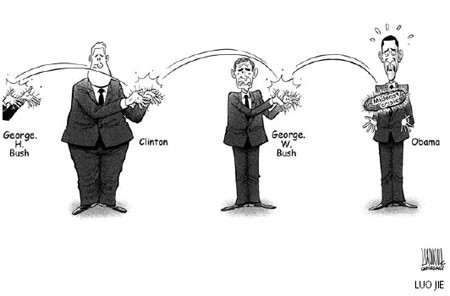Since US President George W. Bush ends his tenure in the Oval Office in a few days, it is necessary to review of the diplomatic legacy he leaves behind for Sino-US relations.
Shortly after the Republican Bush was sworn in, China and the United States confronted each other over one of the severest challenges posed by the collision of a Chinese jet plane with an intruding US spy aircraft over the South China Sea in April 2001. With cool-headedness and reason, the two countries managed to keep the event's impact on bilateral ties to a minimum. Relations have since gained a steady momentum, with common grounds having been continuously consolidated.

Both governments labeled the bilateral ties as constructive and cooperative as early as in 2001, dispelling people's misgivings that the two are strategic competitors. In a speech in September 2005, then deputy Secretary of State Robert B. Zoellick held that China and the US should be stakeholders in global affairs. US Secretary of State Rice Condoleezza Rice also highlighted Beijing's global partnership status on many occasions.
All these demonstrate Sino-US relations have gone beyond the bilateral scope and that the two countries should be in close cooperation to better deal with a variety of challenges in the post-Cold War period. Smooth and effective cooperation between Beijing and Washington on many global and regional issues, such as anti-terrorism strategy, prevention of proliferation of weapons of mass destruction and the fight against the ongoing global financial woes, bears testimony to the expanded common interests.
The two countries have established regular dialogue mechanisms at various levels. During his two terms, Bush has had 19 meetings with President Hu Jintao. It became inevitable that the two heads of state would meet with each other on any international occasion that had their presence and hold candid talks on global and regional issues of common concern.
Good private relations between the two top leaders have endlessly injected a vigor into bilateral ties. With the old dialogue and cooperative mechanisms in place, the two countries have also set up new mechanisms to adapt their ties to changed conditions. The Strategic Dialogue and the Strategic Economic Dialogue are examples of this.
The establishment of these viable communication mechanisms during Bush's tenure has helped reduce differences and enhance mutual trust between the two countries and push forward a healthy relationship. It is believed that the good momentum will be carried into the new US administration and that the two countries will lift established mechanisms to a higher level or create new ones to benefit bilateral dialogue and cooperation.
With years of frictions and cooperation, China and the US have got accustomed to taking account of each other's core interests when coping with sensitive bilateral issues. Fruitful cooperation between them on the nuclear issue on the Korean Peninsula has laid a solid foundation for the final settlement of the thorny regional issue. On the Taiwan question, the one related to China's most fundamental national interest, the White House has also paid due respect to China's concerns. With joint efforts from both sides, a common consensus has been reached on how to safeguard a stable cross-Straits situation.